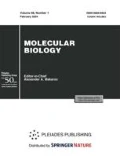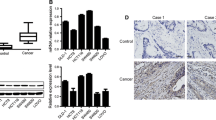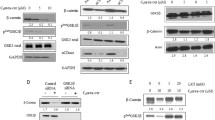Abstract
Colorectal cancer (CRC) is a malignancy featured by a poor overall survival and a high recurrence rate, whereas the biomarkers for CRC remain to be investigated. Herein, it was found that lysophosphatidylcholine acyltransferase 1 (LPCAT1) was highly expressed in CRC, and LPCAT1 overexpression significantly promoted CRC cell proliferation, while it was reversed by LPCAT1 depletion. In addition, HECT domain-containing 2 (HECTD2) protein was determined as a post-translational mediator of LPCAT1 because HECTD2 co-immunoprecipitated with high ubiquitinated LPCAT1. Furthermore, upregulated LPCAT1 rescued the impairment of CRC cell proliferation caused by HECTD2 overexpression. In conclusion, our findings supported HECTD2/LPCAT1 axis as a potential prognostic biomarker in CRC.





Similar content being viewed by others
REFERENCES
Erratum: Global cancer statistics 2018: GLOBOCAN estimates of incidence and mortality worldwide for 36 cancers in 185 countries. CA Cancer J. Clin. 70, 313 (2020).
Feng M., Zhao Z., Yang M., Ji J., Zhu D. 2021. T-cell-based immunotherapy in colorectal cancer. Cancer Lett. 498, 201‒209.
Barbosa A., Savage D., Siniossoglou S. 2015. Lipid droplet-organelle interactions: Emerging roles in lipid metabolism. Curr. Opin. Cell Biol 35, 91‒97.
Shindou H., Hishikawa D., Harayama T., Yuki K., Shimizu T. 2009. Recent progress on acyl CoA: Lysophospholipid acyltransferase research. J. Lipid Res. S46‒S51.
Lin S., Ikegami M., Moon C., Naren A. Shannon J. 2015. Lysophosphatidylcholine acyltransferase 1 (LPCAT1) specifically interacts with phospholipid transfer protein StarD10 to facilitate surfactant phospholipid trafficking in alveolar type II cells. J. Biol. Chem. 290, 18559‒18574.
Dai X., Zhang H., Han J., He Y., Zhang Y., Qi Y., Pang J.J. 2016. Effects of subretinal gene transfer at different time points in a mouse model of retinal degeneration. PLoS One. 11, e0156542.
Okubo M., Yamanaka H., Kobayashi K., Kanda H., Dai Y., Noguchi K. 2012. Up-regulation of platelet-activating factor synthases and its receptor in spinal cord contribute to development of neuropathic pain following peripheral nerve injury. Mol. Pain. 8, 8.
Zhao T., Zhang Y., Ma X., Wei L., Hou Y., Sun R., Jiang J. 2021. Elevated expression of LPCAT1 predicts a poor prognosis and is correlated with the tumour microenvironment in endometrial cancer. Cancer Cell Int. 21, 269.
Han C., Yu G., Mao Y., Song S., Li L., Zhou L., Wang Z., Liu Y., Li M., Xu B. 2020. LPCAT1 enhances castration resistant prostate cancer progression via increased mRNA synthesis and PAF production. PLoS One. 15, e0240801.
Wei C., Dong X., Lu H., Tong F., Chen L., Zhang R., Dong J., Hu Y., Wu G., Dong X. 2019. LPCAT1 promotes brain metastasis of lung adenocarcinoma by up-regulating PI3K/AKT/MYC pathway. J. Exp. Clin. Cancer Res. 38, 95.
Mansilla F., da Costa K., Wang S., Kruhøffer M., Lewin T., Orntoft T., Coleman R., Birkenkamp-Demtröder K. 2009. Lysophosphatidylcholine acyltransferase 1 (LPCAT1. overexpression in human colorectal cancer. J. Mol. Med. Berl. 87, 85‒97.
Deribe Y.L., Pawson T. Dikic I. 2010. Post-translational modifications in signal integration. Nat. Struct. Mol. Biol. 17, 666.
Schwartz A. Ciechanover A. 2009. Targeting proteins for destruction by the ubiquitin system: Implications for human pathobiology. Annu. Rev. Pharmacol. Toxicol. 49, 73‒96.
Jones D., Crowe E., Stevens T.A. Candido E.P.M. 2001. Functional and phylogenetic analysis of the ubiquitylation system in Caenorhabditis elegans: Ubiquitin-conjugating enzymes, ubiquitin-activating enzymes, and ubiquitin-like proteins. Genome Biol. 3(1), RESEARCH0002. https://doi.org/10.1186/gb-2001-3-1-research0002
Wójcik C., DeMartino G.N. 2003. Intracellular localization of proteasomes. Int. J. Biochem. Cell Biol. 35, 579‒589.
Song Y., Wu C., Wu K., Han Q., Miao X., Ma D., Leung C. 2021. Ubiquitination regulators discovered by virtual screening for the treatment of cancer. Front. Cell Dev. Biol. 9, 665646.
Xu Y., Wang C., Jiang X., Zhang Y., Su H., Jiang J., Ren H., Qiu X. 2021. KLHL38 involvement in non-small cell lung cancer progression via activation of the Akt signaling pathway. Cell Death Dis. 12, 556.
Castro-Gonzalez S., Simpson S., Shi Y., Chen Y., Benjamin J., Serra-Moreno R. 2021. HIV Nef-mediated ubiquitination of BCL2: Implications in autophagy and apoptosis. Front. Immunol. 12, 682624.
Liu J., Li X., Zhou G., Zhang Y., Sang Y., Wang J., Li Y., Ge W., Sun Z., Zhou X. 2021. Silica nanoparticles inhibiting the differentiation of round spermatid and chromatin remodeling of haploid period via MIWI in mice. Environ. Pollut. 284, 117446.
Gong Z., Li A., Ding J., Li Q., Zhang L., Li Y., Meng Z., Chen F., Huang J., Zhou D., Hu R., Ye J., Liu W., You H. 2021. OTUD7B deubiquitinates LSD1 to govern its binding partner specificity, homeostasis, and breast cancer metastasis. Adv. Sci. (Weinh.). 8 (15), e2004504.
Shmuel-Galia L., Humphries F., Lei X., Ceglia S., Wilson R., Jiang Z., Ketelut-Carneiro N., Foley S., Pechhold S., Houghton J., Muneeruddin K., Shaffer S., McCormick B., Reboldi A., Ward D., et al. 2021. Dysbiosis exacerbates colitis by promoting ubiquitination and accumulation of the innate immune adaptor STING in myeloid cells. Immunity. 54, 1137‒1153. e8.
Lepore A., Choy P., Lee N., Carella M., Favicchio R., Briones-Orta M., Glaser S., Alpini G., D’Santos C., Tooze R., Lorger M., Syn W., Papakyriakou A., Giamas G., Bubici C., Papa S. 2021. Phosphorylation and stabilization of PIN1 by JNK promote intrahepatic cholangiocarcinoma growth. Hepatology. 74 (5), 2561‒2579.
Kapur R., Semple J. 2016. Alleviation of Gram-negative bacterial lung inflammation by targeting HECTD2. Ann. Trans. Med. 4, 488.
Coon T., McKelvey A., Lear T., Rajbhandari S., Dunn S., Connelly W., Zhao J., Han S., Liu Y., Weathington N., McVerry B., Zhang Y., Chen B. 2015. The proinflammatory role of HECTD2 in innate immunity and experimental lung injury. Sci. Trans. Med. 7, 295ra109.
Sun T., Wang X., He H., Sweeney C., Liu S., Brown M., Balk S., Lee G., Kantoff P. 2014. MiR-221 promotes the development of androgen independence in prostate cancer cells via downregulation of HECTD2 and RAB1A. Oncogene. 33, 2790‒2800.
Li J.H., Liu S., Zhou H., Qu L.H. Yang J.H. 2014. starBase v2.0: Decoding miRNA–ceRNA, miRNA–ncRNA and protein–RNA interaction networks from large-scale CLIP-Seq data. Nucleic Acids Res. 42, D92–D97.
Uhlen M., Oksvold P., Fagerberg L., Lundberg E., Jonasson K., Forsberg M., Zwahlen M., Kampf C., Wester K., Hober S., Wernerus H., Bjorling L., Ponten F. 2010. Towards a knowledge-based Human Protein Atlas. Nat. Biotechnol. 28, 1248‒1250.
Uehara T., Kikuchi H., Miyazaki S., Iino I., Setoguchi T., Hiramatsu Y., Ohta M., Kamiya K., Morita Y., Tanaka H., Baba S., Hayasaka T., Setou M., Konno H. 2016. Overexpression of lysophosphatidylcholine acyltransferase 1 and concomitant lipid alterations in gastric cancer. Ann. Surg. Oncol. 23 (Suppl. 2), S206‒S213.
Shida-Sakazume T., Endo-Sakamoto Y., Unozawa M., Fukumoto C., Shimada K., Kasamatsu A., Ogawara K., Yokoe H., Shiiba M., Tanzawa H., Uzawa K. 2015. Lysophosphatidylcholine acyltransferase1 overexpression promotes oral squamous cell carcinoma progression via enhanced biosynthesis of platelet-activating factor. PLoS One. 10, e0120143.
Grupp K., Sanader S., Sirma H., Simon R., Koop C., Prien K., Hube-Magg C., Salomon G., Graefen M., Heinzer H., Minner S., Izbicki J., Sauter G., Schlomm T., Tsourlakis M. 2013. High lysophosphatidylcholine acyltransferase 1 expression independently predicts high risk for biochemical recurrence in prostate cancers. Mol. Oncol. 7, 1001‒1011.
Liu F., Wu Y., Liu J., Ni R.J., Yang A.G., Bian K., Zhang R. 2020. A miR-205‒LPCAT1 axis contributes to proliferation and progression in multiple cancers. Biochem. Biophys. Res. Commun. 527, 474‒480.
Lebok P., von Hassel A., Meiners J., Hube-Magg C., Simon R., Hoflmayer D., Hinsch A., Dum D., Fraune C., Gobel C., Moller K., Sauter G., Jacobsen F., Buscheck F., Prien K., et al. 2019. Up-regulation of lysophosphatidylcholine acyltransferase 1 (LPCAT1) is linked to poor prognosis in breast cancer. Aging. 11, 7796‒7804.
Du Y., Wang Q., Zhang X., Wang X., Qin C., Sheng Z., Yin H., Jiang C., Li J., Xu T. 2017. Lysophosphatidylcholine acyltransferase 1 upregulation and concomitant phospholipid alterations in clear cell renal cell carcinoma. J. Exp. Clin. Cancer Res. 36, 66.
Hu J., Ding X., Tian S., Chu Y., Liu Z., Li Y., Li X., Wang G., Wang L., Wang Z. 2021. TRIM39 deficiency inhibits tumor progression and autophagic flux in colorectal cancer via suppressing the activity of Rab7. Cell Death Dis. 12, 391.
Li B., Qi Z.P., He D.L., Chen Z.H., Liu J.Y., Wong M.W., Zhang J.W., Xu E.P., Shi Q., Cai S.L., Sun D., Yao L.Q., Zhou P.H., Zhong Y.S. 2021. NLRP7 deubiquitination by USP10 promotes tumor progression and tumor-associated macrophage polarization in colorectal cancer. J. Exp. Clin. Cancer Res. 40, 126.
Erokhov P.A., Kulikov A.M., Karpova Y.D., Rodoman G.V., Sumedi I.R., Goncharov A.L., Razbirin D.V., Gorelova V.S., Sharova N.P., Astakhova T.M. 2021. Proteasomes in patient rectal cancer and different intestine locations: Where does proteasome pool change? Cancers (Basel). 13, 1108.
Boland K., Flanagan L., McCawley N., Pabari R., Kay E.W., McNamara D.A., Murray F., Byrne A.T., Ramtoola Z., Concannon C.G., Prehn J.H. 2016. Targeting the 19S proteasomal subunit, Rpt4, for the treatment of colon cancer. Eur. J. Pharmacol. 780, 53‒64.
Funding
This research did not receive any specific grant from funding agencies in the public, commercial, or not-for-profit sectors.
Author information
Authors and Affiliations
Contributions
Lei Ma and Zhi Xu designed experiments. Lei Ma and Dehui Li carried out experiments and analyzed the results. Lei Ma wrote the manuscript, and Zhi Xu revised the manuscript. All authors approved the final manuscript.
Corresponding author
Ethics declarations
COMPLIANCE WITH ETHICAL STANDARDS
Conflict of interest. The authors declare that they have no conflicts of interests.
Statement of compliance with standards of research involving humans as subjects. The experimental strategy was performed in accordance with the Declaration of Helsinki and was authorized by the ethics committee of Qingdao Municipal Hospital, Qingdao University.
All subjects agreed to participate in this study and signed a complete informed consent form.
ADDITIONAL INFORMATION
The text was submitted by the authors in English.
Supplementary Information
Rights and permissions
About this article
Cite this article
Ma, L., Li, D.H. & Xu, Z. HECTD2 Represses Cell Proliferation in Colorectal Cancer through Driving Ubiquitination and Degradation of LPCAT1. Mol Biol 56, 533–542 (2022). https://doi.org/10.1134/S0026893322040070
Received:
Revised:
Accepted:
Published:
Issue Date:
DOI: https://doi.org/10.1134/S0026893322040070




